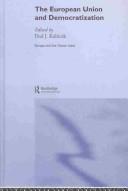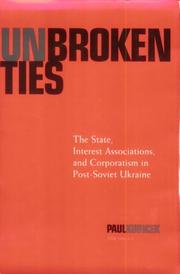| Listing 1 - 10 of 10 |
Sort by
|
Book
Abstract | Keywords | Export | Availability | Bookmark
 Loading...
Loading...Choose an application
- Reference Manager
- EndNote
- RefWorks (Direct export to RefWorks)

ISBN: 0822958562 1322068453 0822972670 9780822972679 Year: 2004 Publisher: Pittsburgh, Pennsylvania : University of Pittsburgh Press,
Abstract | Keywords | Export | Availability | Bookmark
 Loading...
Loading...Choose an application
- Reference Manager
- EndNote
- RefWorks (Direct export to RefWorks)
Labor unions --- Post-communism --- Syndicats --- Postcommunisme --- #SBIB:316.334.2A417 --- Arbeidssociologie: de vakbeweging in Oost-Europa --- E-books --- Postcommunism --- World politics --- Communism --- Industrial unions --- Labor, Organized --- Labor organizations --- Organized labor --- Trade-unions --- Unions, Labor --- Unions, Trade --- Working-men's associations --- Labor movement --- Societies --- Central labor councils --- Guilds --- Syndicalism --- Oost-Europa. --- GOS. --- Russland --- Polen --- Ungarn --- Ukraine --- Eastern Europe

ISBN: 1134386230 1280048433 020345846X 9780203458464 9780415311366 0415311365 0415311365 9781134386239 9781280048432 9781134386185 9781134386222 1134386222 Year: 2003 Publisher: London Routledge
Abstract | Keywords | Export | Availability | Bookmark
 Loading...
Loading...Choose an application
- Reference Manager
- EndNote
- RefWorks (Direct export to RefWorks)
The European Union has been a key actor in promoting democratization and providing assistance to encourage political change. This book assesses the EU's contribution to democratization by looking at the failures and states that offered resistance to EU pressure to reform, aiming to understand how the EU overcame or failed to overcome the numerous barriers blocking democratic progress. The book features studies on Slovakia, Romania, Croatia, Turkey, Ukraine, Morocco and Latvia.
Democratization --- Human rights --- Post-communism --- Democratic consolidation --- Democratic transition --- Political science --- New democracies --- European Union countries --- Europe, Eastern --- East Europe --- Eastern Europe --- EU countries --- Euroland --- Europe --- Ethnic relations. --- Foreign relations
Book
ISBN: 1626375399 1626372527 Year: 2015 Publisher: Boulder, Colorado ; London, [England] : Lynne Rienner Publishers,
Abstract | Keywords | Export | Availability | Bookmark
 Loading...
Loading...Choose an application
- Reference Manager
- EndNote
- RefWorks (Direct export to RefWorks)
Belying assertions of the incompatibility of Islam and democracy, many Muslim-majority countries are now or have been democratic. Paul Kubicek draws on the experiences of those countries to explore the relationship between political manifestations of Islam and democratic politics. Kubicek's comparative analysis allows him to highlight the common features that create conditions amenable to democratic development in Muslim-majority countries—and to show how actors in Muslim democracies in fact draw on concepts within Islam to contribute to democratization.
Islam and politics --- Democracy --- Political culture --- Culture --- Political science --- Self-government --- Equality --- Representative government and representation --- Republics --- Islam --- Politics and Islam --- Political aspects
Book
ISBN: 9780367464394 036746439X Year: 2021 Publisher: Abingdon: Routledge,
Abstract | Keywords | Export | Availability | Bookmark
 Loading...
Loading...Choose an application
- Reference Manager
- EndNote
- RefWorks (Direct export to RefWorks)
European Politics expertly and accessibly surveys the history, institutions, and issues that are essential for understanding contemporary European politics. Exploring a central question—"what is Europe?"—this text's thematic approach helps students compare politics in individual countries and see the political big picture in the region. European Politics examines not only countries which are (or were) in the European Union but also those eligible to join, to give students the most comprehensive picture of Europe's evolution in a globalized world. Key changes for the new edition include: coverage of hot topics such as Brexit, Covid-19, rise of nationalist-populists, authoritarian developments in Hungary, Poland, and Turkey, separatism in Catalonia, refugees/migrants, environmentalism, Ukraine, Russia, US-European relations, recent elections, and security threats emanating within Europe and beyond; a consolidated presentation on the European Union; fully updated data and examples; and a new concluding chapter recapping the main ideas and suggesting scenarios for the European project moving forward. This timely, in-depth text will be essential reading for anyone interested in European politics

ISBN: 0472110306 Year: 2000 Publisher: Ann Arbor University of Michigan press
Abstract | Keywords | Export | Availability | Bookmark
 Loading...
Loading...Choose an application
- Reference Manager
- EndNote
- RefWorks (Direct export to RefWorks)
Post-communism --- Pressure groups --- Ukraine --- Politics and government

ISBN: 0415311365 Year: 2003 Publisher: London Routledge
Abstract | Keywords | Export | Availability | Bookmark
 Loading...
Loading...Choose an application
- Reference Manager
- EndNote
- RefWorks (Direct export to RefWorks)
International relations. Foreign policy --- Political systems --- European Union --- HUMAN RIGHTS -- 346 --- #SBIB:327.7H200 --- #SBIB:328H200 --- Europese Unie: algemeen --- Instellingen en beleid: Europa: comparatief / diverse landen --- Democratization --- Human rights --- Post-communism --- Democratic consolidation --- Democratic transition --- European Union countries --- Europe, Eastern --- East Europe --- Eastern Europe --- EU countries --- Euroland --- Ethnic relations. --- Foreign relations --- Political science --- New democracies --- Europe
Book
ISBN: 9781138914957 9781315690520 9781317427353 9781317427360 9781138320956 Year: 2016 Publisher: London Routledge
Abstract | Keywords | Export | Availability | Bookmark
 Loading...
Loading...Choose an application
- Reference Manager
- EndNote
- RefWorks (Direct export to RefWorks)
While Turkey made major strides in democratic reforms in the 1990s and early 2000s, progress has, in many ways, stalled. Turkey remains 'democratic' in the sense that attaining political power depends upon winning votes, but in recent years its leadership has taken a majoritarian view of democracy and the country has faced problems on issues such as rule of law, freedom of speech, and increased polarization. This book explores the understanding and practice of democracy in Turkey since the early 2000s, analyzing its evolution in light of the parliamentary elections held in 2015. Adopting a more holistic approach in line with the writing of Wolfgang Merkel, it recognizes that a successful, consolidated democracy has various micro- and macro-level foundations. The former includes factors such as political values, tolerance, identity, and civil society, while the latter includes political economy, party competition, and institutional development. This volume rejects purely descriptive assessments and instead employs theoretical perspectives to analyze a dynamic political environment. It brings together a range of noted specialists on Turkish politics and society, who employ different methodological approaches and frameworks to offer a distinct scholarly work on democratization in Turkey.
DEMOCRACY--TURKEY --- DEMOCRATIZATION--TURKEY --- TURKEY--POLITICS AND GOVERNMENT
Book
ISBN: 9780313349201 0313349207 Year: 2008 Publisher: Westport (Conn.) : Greenwood Press,
Abstract | Keywords | Export | Availability | Bookmark
 Loading...
Loading...Choose an application
- Reference Manager
- EndNote
- RefWorks (Direct export to RefWorks)
Book
ISBN: 9781138818507 Year: 2015 Publisher: London : Routledge,
Abstract | Keywords | Export | Availability | Bookmark
 Loading...
Loading...Choose an application
- Reference Manager
- EndNote
- RefWorks (Direct export to RefWorks)
| Listing 1 - 10 of 10 |
Sort by
|

 Search
Search Feedback
Feedback About UniCat
About UniCat  Help
Help News
News